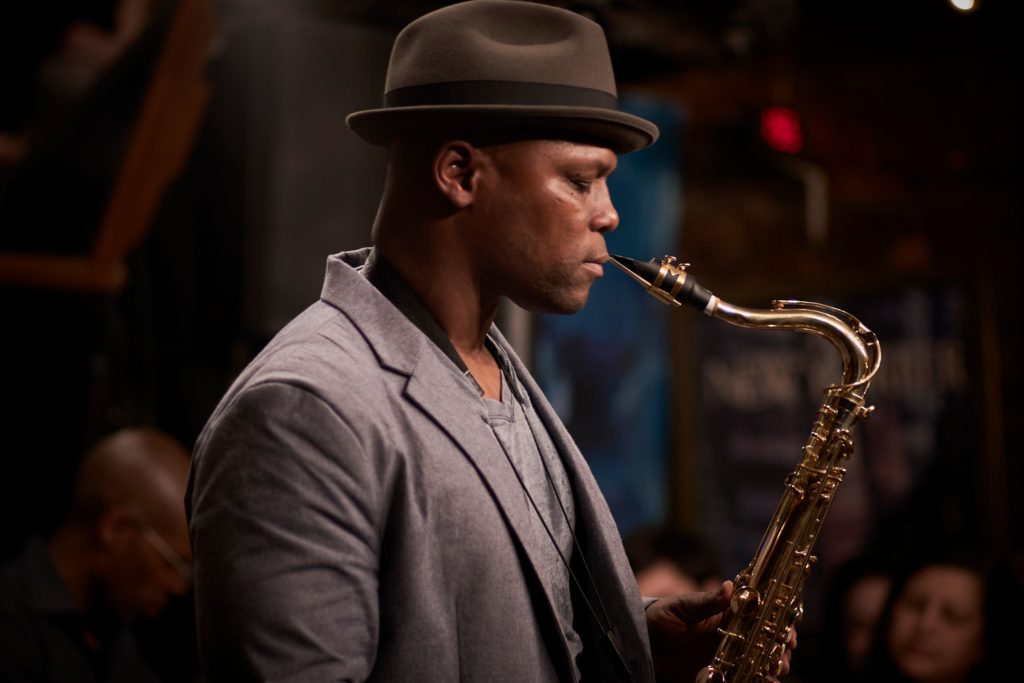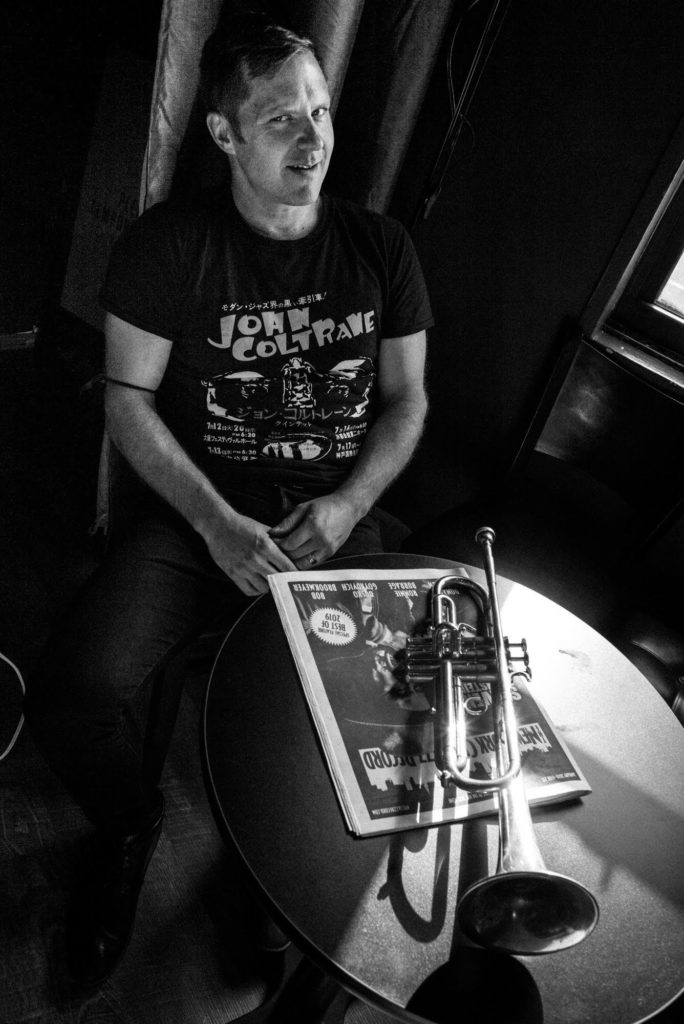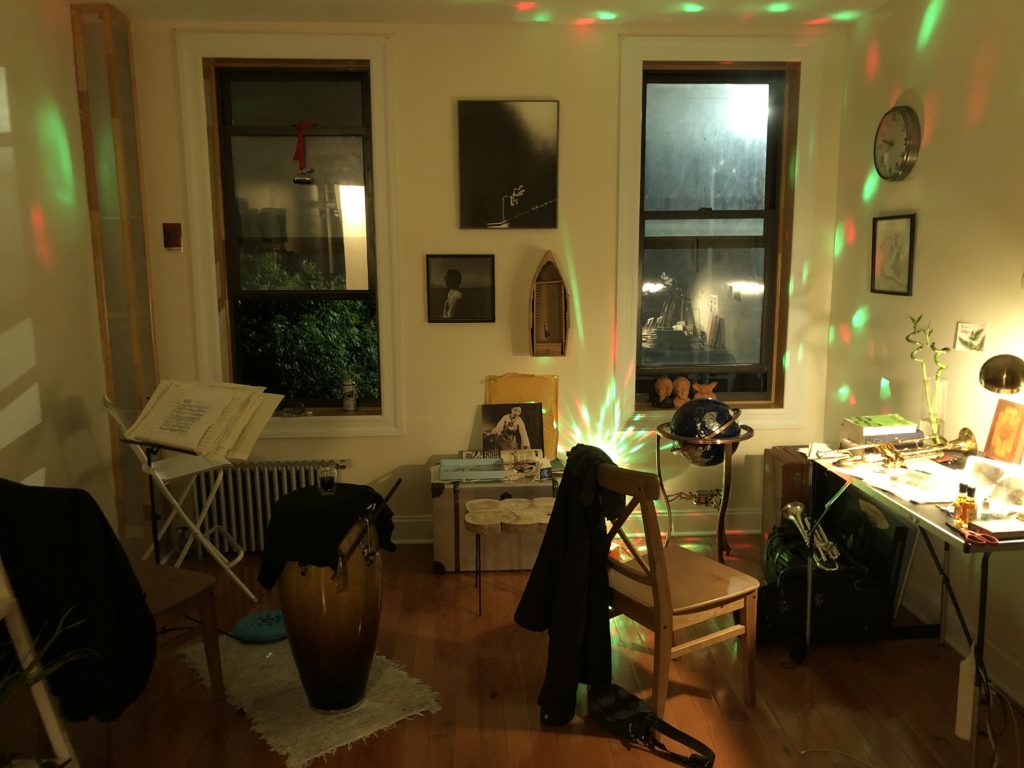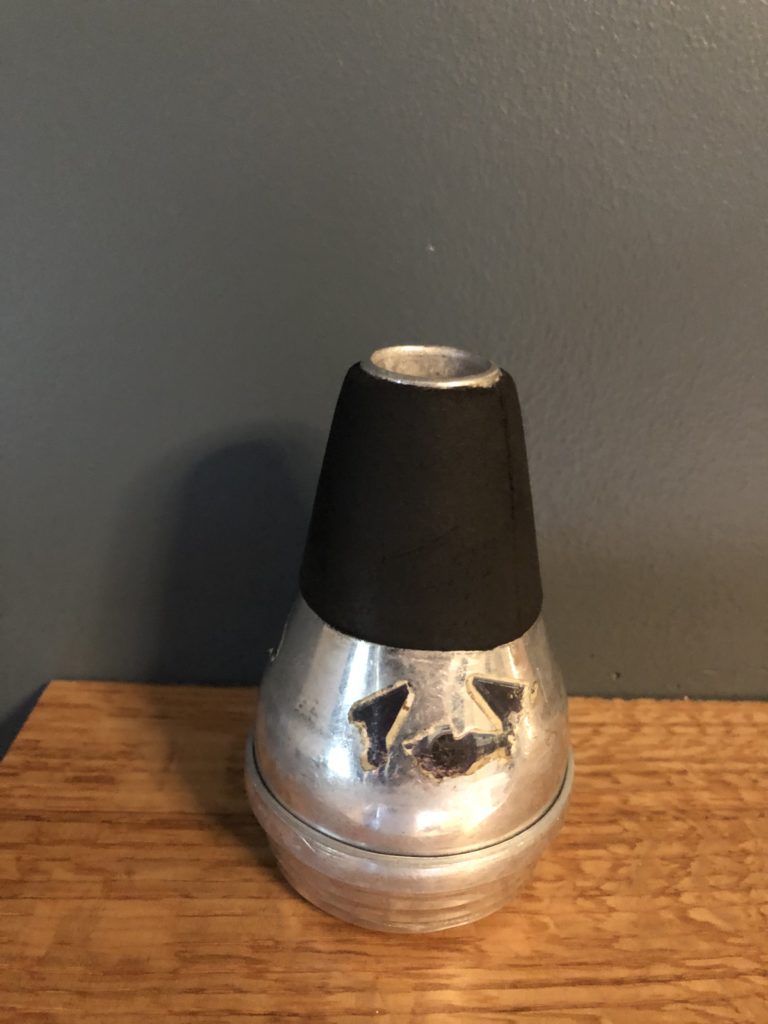
Jacob Garchik (b. 1976) is a composer, arranger, and trombonist. He has released five albums as a leader including The Heavens: the Atheist Gospel Trombone Album for a one-man trombone choir; Ye Olde, based on an original poem set in an imaginary ancient Brooklyn; and his latest, Clear Line, a big band record for 13 horns (with no rhythm section), inspired by the ligne claire drawing of Belgian cartoonist Hergé.
Garchik is co-founder (with Oscar Noriega) of Banda de los Muertos, which plays traditional Mexican banda music. And Garchik has contributed nearly 100 arrangements and transcriptions for the venerable Kronos Quartet. In 2017 he composed the score for “The Green Fog,” a found-footage remake of Vertigo directed by Guy Maddin.
I spoke to Jacob by Zoom in August 2021.
Where are you right now?
I’m in my basement in a house in Flatbush, Brooklyn.
Is that where you usually practice?
Yup. We live upstairs so usually I practice down here. Occasionally I practice upstairs if nobody else is around, but usually my wife works from home. My kid is sometimes around, but not during the day. He’s in day care, so I’m down here practicing.
How old is your son?
Three-and-a-half.
Can you practice in the basement any time you want? Do you have to worry about neighbors?
It’s not so well insulated from my own house, but side-to-side they don’t hear much. And in Flatbush there’s a high tolerance for noise. It’s one of the reasons why I was attracted to this neighborhood. I make a lot of noise.
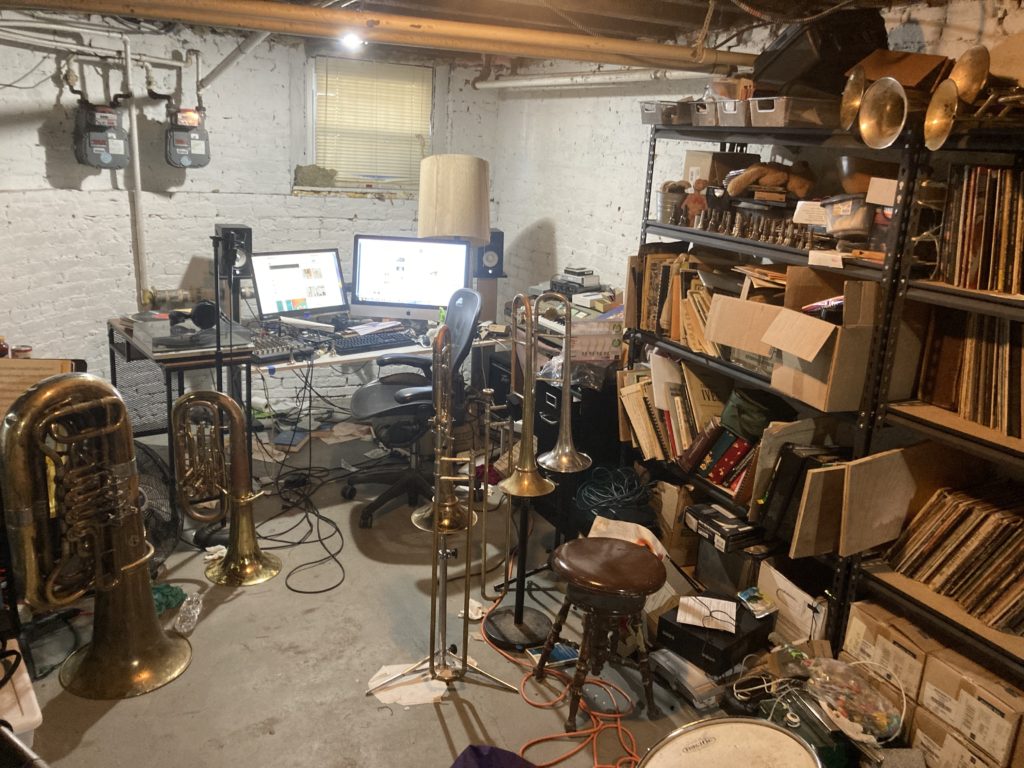
Have you played today?
I warmed up on very slow major scales. It’s an exercise I got from my teacher Dave Taylor at Manhattan School of Music. I’ve been doing it for twenty-five years. Slow major scales starting in the low register, one octave.
This slow, methodical exercise helps you build skills and muscles which can then be used for any type of playing – faster playing, or high register playing, or things that have to do with flexibility.
What music have you been working on?
I play Bach Cello Suites, especially the first three. It’s incredible music, and they get around the horn pretty well. There’s a variety of playing – legato, technical faster playing, and slower melodic stuff, too. There are linear parts and wider intervals. It’s a good mix, a lot of different things that you might encounter in other music.
I recently got a euphonium so sometimes I do Bach an entire day just playing that. Last month I had a tuba gig, so I did some of the Bach on tuba. Otherwise, I just do them on tenor trombone.
What’s the process of learning music for other people’s bands? Like, I know you played on Anna Webber’s recent album Idiom.
Anna Webber’s music can be challenging, but it’s not really the type of thing that I need to practice for hours at home. She’s got some tricky licks, but a lot of it is more conceptual. Or maybe I’ll have to figure out a rhythm, but I usually do that by looking at the music, not playing it on the instrument.
Do you practice improvising?
I do an exercise where I look at different aspects of music that can be manipulated – harmony, rhythm, texture, register, tone color, tempo, genre. Then I pick a handful of them to restrict my improvisation. It can be absurd, like, I’m gonna practice playing salsa in the low register, in F#, in 5/4. It can also be more practical, like practicing the blues in F at quarter note equals 180. It can also be very abstract, like, I’ll practice circular breathing on one note and vary the tone color in an organic way over five minutes. Little exercises like that get my improvisational muscles working.
What’s an exercise you’d suggest for a trombonist trying to get a good tone.
The slow major scales are good for that, but first there has to be a lot of talking. When I start with students, we talk about it for hours, or weeks or months. Because the exercise has to be done in a way that incorporates posture, physiology, and the mechanics of sound production. There’s nothing to the exercise, but it almost doesn’t matter what it is if you’re doing the mechanical, physiological parts correctly.
You also develop your tone from hearing good players in person. You train your ear to recognize beautiful sound, and then your body starts copying that sound. When I was growing up, I heard the brass section of the San Francisco Symphony. Then in college, I saw Joe Lovano, Eddie Henderson, Roswell Rudd, Ron Carter, Al Foster, Elvin Jones, Paul Motian.
Drummers influence your approach to tone production on trombone?
Yes. Because you start to hear the difference. I went to music school with a bunch of nineteen-year-old jazz drummers bursting with energy. They have a sound on the instrument. Then I would hear one of these masterful drummers who have been playing seventy years. They sit down at the set and make a sound and it’s amazing.
What would you suggest for someone trying to learn to swing?
Listen to a lot of music and play with people – that’s ninety-nine percent of what you need to do, and then maybe one percent is something that you would do at home with your instrument in the practice room.
Swing is ephemeral and hard to put your finger on. You need to listen and have a familiarity with the history of American music, an openness to the variety of swing, what it means. If you listen to seventy trumpet players, every one of them has a different sense of swing and it’s important to dig into their concept. How does this person interact with the bass and the drums? Are they on top of the beat, on the beat, behind the beat, mixing and matching within a phrase? How is it successful or unsuccessful?
I have an analytic mind, so I put it in technical language. I’ll say, Miles Davis, in bar seventeen, he really held back on the beat until beat four. But some people are like, oh, I love Miles Davis, the way he plays do-do-buh do-bop. It’s the same analysis – one way is more descriptive, and one way is internalizing it without putting it into words.
You should play with a wide variety of people – people who are at your level, above your level, and sometimes beneath your level – and be observant. See what works, what feels good and what doesn’t. Sometimes you play with a rhythm section and it’s like, man, why is this not gelling? Oh, I notice that so-and-so plays really behind the beat or does a funny thing with eighth notes that I don’t like. But oh, they sound good with someone else. It’s this type of analysis.
Playing along with recordings is also good. I was never a fan of Music Minus One or Jamey Aebersold, but I am a fan of playing along with real recordings of the masters. Just turn it up or use headphones and play along in real time.
What’s a recording you play along with?
Coltrane, Live at Birdland. Because of the stereo mix, you can tune out Coltrane.
Also all of the Miles and Coltrane Prestige records – Workin’, Cookin’, Steamin’, Relaxin’. Those are excellent in terms of a variety of tempos, keys and tunes. It’s got Tin Pan Alley, Monk, bebop. That’s an excellent way to learn the basics.
I know you do a lot of arranging, including for the Kronos Quartet. Any suggested exercises for someone looking to get into that craft?
I teach a course at Mannes at the New School in arranging so they can sign up! But otherwise, they should just start doing it. My students do three arrangements of piano music for a small ensemble consisting of whatever instruments happen to be in the class. It’s not precious. I don’t say, first you’ll arrange for a string quartet, then a brass quintet, then a string orchestra. It’s more, you’re gonna arrange this funny little piece for this funny little ensemble which is completely impractical and outside what you’d see in real life.
But the process is important – assessing the strengths and weaknesses of each instrument, considering what you need in your ensemble, how to distribute the parts. What you need to know about an instrument you know nothing about – what’s the lowest note, the highest note; what sounds good, what doesn’t sound good; what’s hard, what’s easy.
I learned all this stuff by getting together with friends in small ensembles and just churning out arrangements – a Brazilian song, Arnold Schoenberg, Max Roach and Abbey Lincoln, James Brown. My listening tastes are eclectic and I’d always be like, I like that, I want to play it. I’ll play it even though it’s gonna be this funny ensemble, different instruments.
Do you still listen to a lot of music?
Yeah, usually during the day, here in the basement. I have a record player I found on the street and fixed up, and I have these excellent headphones.
What have you been listening to?
Tracy Chapman, early Stevie Wonder, Sly and the Family Stone’s Stand. That one was fun because I have it on digital also. I went back and forth, A/B tested it, and it sounds good on vinyl. I really enjoy that type of deep listening in headphones, immersion.
My kid right now doesn’t like listening to music that much. I would love to be able to put on a record and hang out with the family, but unfortunately he’s in a phase where he just wants TV or toys and no music, so we don’t do that much listening upstairs.
Do you take your horn on vacation?
I like to have an instrument most of the time, but now that I have a kid it’s more difficult because we have so much other stuff. I just did a vacation where I didn’t take one. I brought the mouthpiece, but I didn’t end up taking it out. It was two weeks without playing, but we’re in a pandemic and I didn’t have any gigs to come rushing home to. I recovered. It wasn’t a big deal.
Does the need to practice ever cause friction in your family life?
Family comes first. I prioritize and we make it work. There are days when I can’t practice at all because there’s some sort of crisis, but thankfully the kid still goes to bed at eight thirty or nine. So then if it’s been a long day, I can come down and practice. He’s in day care on weekdays, thank God, so those are the days that I have time to do substantial practice.
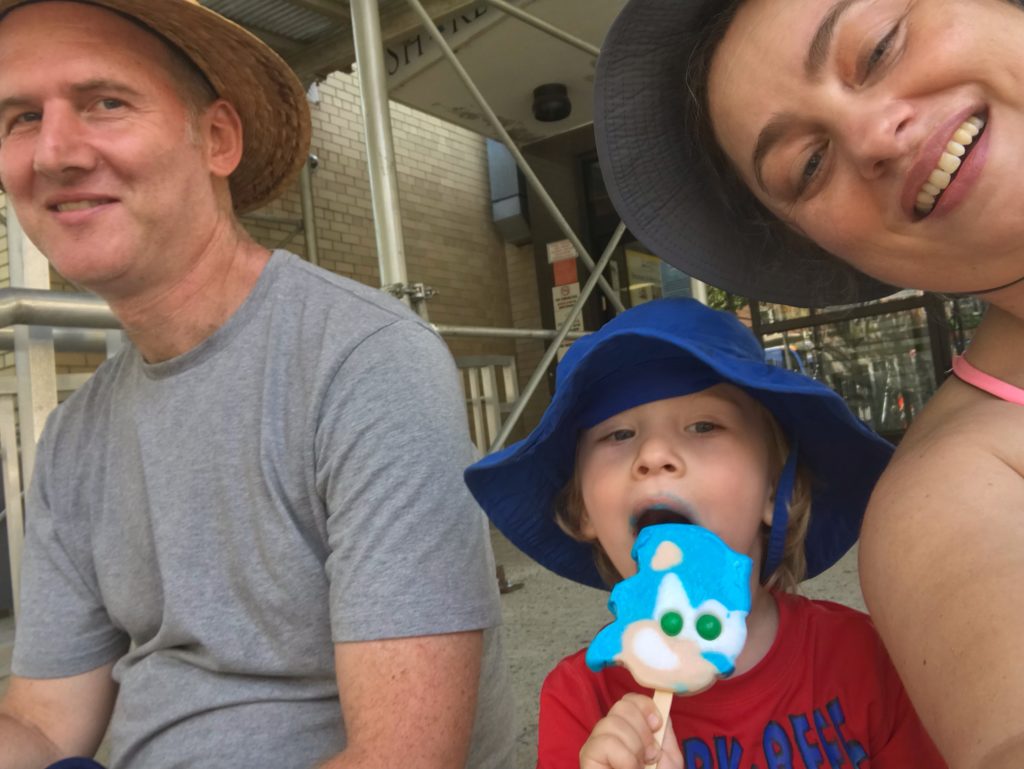
Where’s your phone while you practice?
Right now it’s upstairs, but I have a computer down here.
Does it distract you?
If I’m doing the more repetitive mindless practice it doesn’t require complete attention. In fact, it benefits from internalizing, making the physical aspects more subconscious, automatic, involuntary. So I’ll read articles on the internet, watch TV, watch movies, read a book, do crossword puzzles, anything.
Any final thoughts?
Practicing is beautiful and important, but I find that the biggest things that contribute to my music getting better are conceptual and not things that I do in the practice room.
Sometimes I feel like there’s an imbalance in people’s playing between one and the other. Rather than just, I’ve mastered the technical skills to play that one phrase, it’s important to think about what that next note is and why it’s that note. You ask, why am I doing that? The bigger picture type stuff.
How do you explore the big picture?
It can mean anything – listening to a lot of music, reading books about music, just wandering around thinking about music. Reading biographies of composers, instrumentalists, improvisers, and pop musicians. Thinking about style and evolution and innovations. The view from fifty-miles up type stuff.
Like how did funk develop? How did the rhythm section change what they were doing in this way that created funk? I’m just a trombone player in a practice room, but I ask how I can use these massive shifts in genre, in the history of music, to introduce a shift in what I’m doing. Not just be like, I’m just a guy who plays one note at a time and I’m gonna regurgitate this bebop lick.
Sometimes I hear people and think, well, they spent a lot of time in the practice room, but there really isn’t that type of interrogation – why am I doing this, what’s the history and the genre and what comes after this? I think it’s important to balance instrumental practice and this big picture philosophizing stuff.
I guess it’s telling you didn’t even play on your last album, just conducted.
That’s right.
Let’s do a lightning round to finish. Name one good:
Children’s song
“Bananaphone” by Rafi
J.J. Johnson Performance
“Misterioso,” from In Person, reissued on Trombone Master
It’s a live performance, and he’s just impeccable – the development of the solo and the restraint and the unbelievable sound and technique. The whole group sounds amazing. Nat Adderley plays almost more amazing than J.J.
Roswell Rudd performance
“Rosmosis” from New York Art Quartet is a great solo.
The album is abstract in a lot of ways, then we get to this tune and Roswell just plays a couple notes on the blues for a minute. It’s an interesting modern way of thinking, this very abstract atonal record and then you’ve got this really bluesy moment and the rhythm section still playing abstract underneath him.
Use of trombone in contemporary classical music
“Partiels” from Les Espaces Acoustiques by Gerard Grisey
Humorous use of trombone
“Trombonik Tanz” by Mickey Katz
The trombonist is Si Zentner, who became a sort of easy-listening star, but was an incredible studio and klezmer player.
“It Might As Well Be Spring,” from Bill Harris with Ben Webster
Harris is a holdover from the swing era playing into the bebop era. His playing makes use of the maximum expressive vocal quality of the trombone in a way that makes me laugh.
An awful arrangement
What do you mean awful?
I thought maybe as an arranger you might know egregious examples of the art form. Or something in poor taste, but well done.
Not at all awful, but “Autumn Leaves,” by Esquivel
It’s complete cheese, it’s lounge music, but as an orchestrator-arranger, I think he’s unbelievable.
